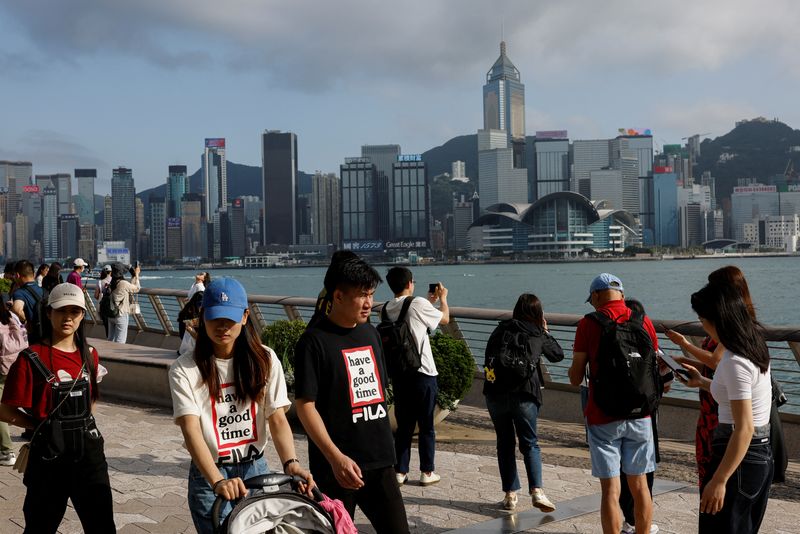By Kevin Yao
BEIJING (Reuters) - China's economy likely grew 7.3% in the second quarter from a year earlier due to a low base, but momentum is rapidly faltering, a Reuters poll showed, raising expectations Beijing will have to roll out more stimulus measures soon.
While the reading will be heavily skewed by economic pains caused by COVID-19 lockdowns last year, the expected expansion would be the highest since the second quarter of 2021, according to the median forecasts of 56 economists polled by Reuters.
Gross domestic product grew a stronger than expected 4.5% in the first quarter, driven by pent-up demand after three years of COVID curbs, but momentum has faded since April as demand at home and abroad weakens.
Highlighting the swift and sharp deceleration, analysts forecast the economy grew just 0.5% in the second quarter from the first three months of the year, when it expanded 2.2%.
"The economy lacks internal driving forces and it's not surprising to see a growth slowdown on a sequential basis," said Zhang Yiping, economist at China Merchants Securities.
"We expect some policy steps, but aggressive stimulus looks unlikely."
Economists blame the fading recovery on the "scarring effects" caused by the strict COVID measures and protracted regulatory curbs on the property and tech sectors. With uncertainties running high, cautious households and private businesses are building up their savings and paying off their debt rather than making new purchases or investments.
Data on Thursday showed China's exports fell the most in three years in June, slumping a worse-than-expected 12.4% year-on-year, as cooling global demands adds more stress on the economy.
Earlier this week, data showed producer prices fell at the fastest pace in over seven years in June and consumer prices teetered on the verge of deflation.
Premier Li Qiang, during a meeting with economists last week, pledged to roll out policy measures in a timely manner to stabilise growth and employment.
All eyes are on an expected Politburo meeting later this month, when top leaders could chart the policy course for the rest of the year.
While China is seen on track to hit its modest 2023 growth target of around 5%, a deeper slowdown could stoke more job losses and fuel deflationary risks, further undermining private-sector confidence, economists said.
Economic growth is likely to slow to 4.8% in the third quarter and 5.3% in the fourth, with full-year growth expected to reach 5.5%, the poll showed.
MORE STIMULUS EXPECTED
Authorities are likely to roll out stimulus steps including fiscal spending to fund big-ticket infrastructure projects, more support for consumers and private firms, and some property policy easing, policy insiders and economists said.
China's central bank on Monday extended until the end of 2024 some policies which were unveiled in a November rescue package to shore up the real estate sector, including loan repayment extensions for developers.
Analysts polled by Reuters expect the central bank to cut banks' reserve requirement ratio (RRR) by 25 basis points in the third quarter, while keeping benchmark lending rates steady.
The central bank cut the RRR - the amount of cash that banks must hold as reserves - in March.
China cut its benchmark lending rates by a modest 10 basis points in June, the first such reduction in 10 months.
But the central bank is likely to be wary of cutting lending rates further. A reluctance to borrow among private companies and households means that continued policy easing could hurt banks that are already battling margin pressures, analysts said.

Aggressive easing could also trigger more capital outflows from China's struggling financial markets and pressure the yuan currency, which recently skidded to eight-month lows.
(For other stories from the Reuters global long-term economic outlook polls package:)
(Polling by Devayani Sathyan & Susobhan Sarkar in Bengaluru and Jing Wang in Shanghai; Reporting by Kevin Yao; Editing by Kim Coghill)